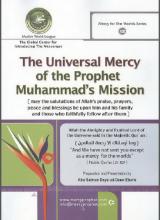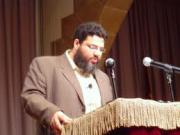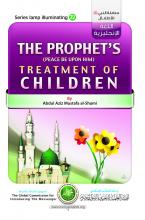The Prophet of Mercy Website
Muslim World League - Global Commission for Introducing the Messenger
When the Prophet (Peace and blessings of Allah upon him) entered Madinah, its people welcomed him with gladness and cordiality. There was no house he passed but that its owner would take hold of his camel's rope and urge him to stay with him. But he (Peace and blessings of Allah upon him) apologized to each of them and said, "Let her go, for she is commanded [by Allah]." The she-camel kept on walking until it reached the place of his masjid where it sat down. Then it got up and went ahead a short way, but returned to the first spot and sat down again. The Prophet (Peace and blessings of Allah upon him) dismounted on the land of his maternal uncles, Bani an-Najjar. He (Peace and blessings of Allah upon him) asked, "Which of our family's houses is nearest?" Abu Ayyub said, "Mine, O Messenger of Allah (Peace and blessings of Allah upon him)." So the Prophet (Peace and blessings of Allah upon him) stayed with Abu Ayyub al-Ansari (may Allah be pleased with them).
The first thing the Messenger of Allah (Peace and blessings of Allah upon him) did after arriving in Madinah was to built his masjid in the place where the she-camel had stopped. The land was owned by two orphan boys and he (Peace and blessings of Allah upon him) purchased it from them. He (Peace and blessings of Allah upon him) took part in the construction himself and then built his wives' apartments next to the masjid. When the apartments were completed he left the house of Abu Ayyub(may Allah be pleased with them) and moved there. And he established the adhaan to assemble the people at prayer time.
The Prophet (Peace and blessings of Allah upon him) established a bond of brotherhood between the Muhajireen (those who had emigrated from Makkah) and the Ansar. They were ninety men, half from the Muhajireen and half from the Ansar. The brotherhood included mutual support and that they would inherit one another in place of their relatives. This lasted until the battle of Badr, when Allah(Almighty) revealed:
And the [blood] relatives are more entitled [to inheritance] in the decree of Allah. (33:6) So, inheritance was restored to Muslim relatives and was no longer for the adopted brother.
The Messenger of Allah (Peace and blessings of Allah upon him) made peace with the Jews of Madinah and drew up a written pact between them and himself. Their religious scholar, `Abdullah ibn Salam(may Allah be pleased with them), entered Islam but most of them remained disbelievers.
And he (Peace and blessings of Allah upon him) coordinated relationships between the Muhajireen, the Ansar and the Jews. Some of the books of seerah (his biography) mentioned the conditions stated in the document, some of which are:
The believers from among the Muhajireen and the Ansar are one community, excluding [other] people.
Believers shall not leave anyone destitute among them, but give to him according to what is acceptable.
The righteous believers shall stand against anyone among them who oppresses or seeks to spread injustice, sin, aggression or corruption among the believers. They shall all stand against him even if he should be the son of one of them.
A believer shall not kill a believer in retribution for an unbeliever, nor shall he aid an unbeliever against a believer.
The protection given in the name of Allah(Almighty) is one [respected by all]. The most humble of Muslims may grant protection to someone on behalf of all. Believers are protectors of one another, to the exclusion of others.
The Jews who follow us will have support and equality. They shall not be wronged nor their enemies aided.
Peace efforts for the believers must be as one. No peace agreement shall be made by believers when others are fighting in the cause of Allah(Almighty) except when all concur.
Whenever you differ over anything it must be referred to Allah (Almighty) and to Muhammad (Peace and blessings of Allah upon him).
The Jews of Bani `Auf are one community with the believers. The Jews have their religion and the Muslims have theirs. And their freedmen and their persons are guaranteed except for one who wrongs himself and sins, for he only harms himself and the members of his household.
The close friends of the Jews are as themselves. None of them shall go out to war except with permission of Muhammad (Peace and blessings of Allah upon him).
One who is under protection shall be [as secure] as his protector, doing no harm and committing no sin.
Safety and protection shall not be granted unless by consent of its people.
These are some clauses of the pact which established the foundations of mutual coexistence between the groups living in Madinah and defined the concept of the Islamic Ummah, which includes all Muslims, and the Islamic state, which was then the city of Madinah. It stipulated that the highest authority is Allah(Almighty) and His Messenger (Peace and blessings of Allah upon him), especially in cases of disagreement and dispute. This document also guaranteed freedom of belief and worship as well as the right of every individual to security. And it confirmed the principle of equality and justice for all people.
Anyone who contemplates the clauses of this pact will find in them many of the refined principles for which the advocates of human rights are presently calling. The Prophet (Peace and blessings of Allah upon him) was the first to outline these rights and systemize them according to Allah's legislation as stated in the Qur'an and Sunnah. This just system of human rights is in clear contrast to what the international organizations claim to be rights, while in reality they are oppression, injustice, violation of human dignity and partiality toward certain groups at the expense of others.
******







